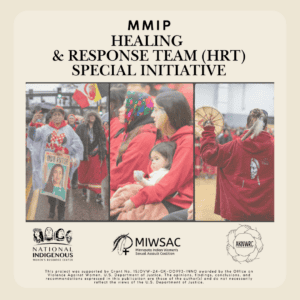Led by the Minnesota Indian Women’s Sexual Assault Coalition (MIWSAC), in partnership with Alaska Native Women’s Resource Center (AKNWRC) and National Indigenous Women’s Resource Center (NIWRC), and funded in October 2024 by the Office on Violence Against Women (OVW), the Healing and Response Teams Special Initiative, was created in response to recommendations made by the Not Invisible Act Commission (NIAC). This special initiative will support the creation, training, and sustainability of an interactive Toolkit, informed by our Tribal communities, to help develop Healing and Response Teams (HRT) to respond to Missing or Murdered Indigenous People (MMIP) cases related to domestic violence, dating violence, sexual assault, stalking, and sex trafficking.
The prevalence of violence against AI/AN women, children, and people in Indian Country is a significant issue affecting various communities, including those in rural, suburban, and urban areas. Federal reports indicate that 4 in 5 Native women (84.3%) have experienced gender-based violence during their lifetime; and over half (56.1%) have been subjected to sexual violence (1). Additionally, American Indian and Alaska Native women are stalked at more than twice the rate of women from other races, while their murder rates exceed the national average by tenfold. Homicide is the third leading cause of death for Native women and girls (2). Violence against Native women is not a new phenomenon but rather a continuation of historical trends of violence (3).
According to the BJS (2022) the majority of victims go without services or are significantly underserved (4). Programs that are grounded in traditional knowledge, teachings, and ceremony can serve as protective factors against gender-based violence. At MIWSAC we work to combat stereotypes and provide space for all who show up in community. There is an explicit need to rehumanize victims/survivors in the work that we do, and to provide opportunities for victims/survivors to reconnect with our cultural teachings
Families of MMIP victims and survivors are calling for justice and healing. This project seeks to develop tools to enhance services to the survivors and families affected by MMIP. The objective is to empower communities and service providers to respond effectively and collaboratively to MMIP cases by implementing Tribal-based models of care that will address the need for accessible, reliable, culturally appropriate services, while emphasizing community participation, and self-determination.
For more information on the MMIP HRT Special Initiative, contact Melissa Skeet, MMIP Project Coordinator, at [email protected], or reach out to Becki Jordan ([email protected]), MIWSAC National Projects Director, to learn more about the overall work of MIWSAC.
NCAI Policy Research Center. (2018). Research Policy Update: Violence Against American Indian Women and Girls. National Congress of American Indians. https://www.ncai.org/policy-research center/research-data/prc-publications/VAWA_Data_Brief__FINAL_2_1_2018.pdf.
Lucchesi, A. & Echo-Hawk, A. (2019). Missing and Murdered Indigenous Women & Girls. Urban Indian Health Institute.
Hartman, J. (2020). Seeking Justice: How VAWA Reduced the Stronghold Over American Indian and Alaska Native Women. Violence Against Women, 27(1), 52-68. https://doi.org/10.1177/1077801220949695
Bureau of Justice Statistics. (2022). Criminal Victimization, 2021. https://bjs.ojp.gov/content/pub/pdf/cv21.pdf


